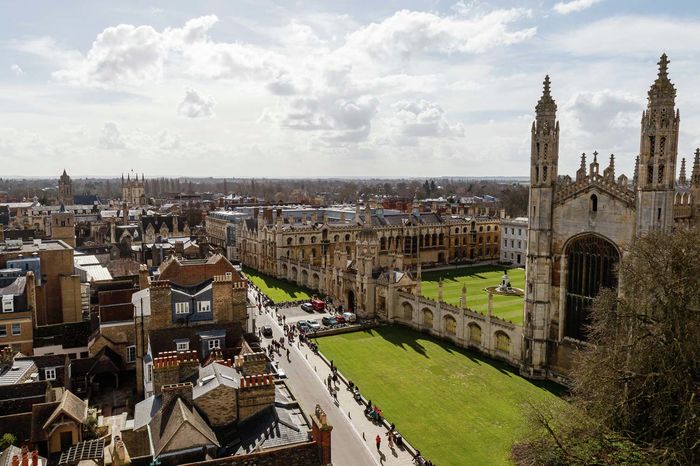XR action intensifies as activists fly-post Sidgwick and disrupt climate lecture
Extinction Rebellion Cambridge are unhappy with the University’s response to their climate demands

At the start of a “series of pressure building actions against the University”, Extinction Rebellion (XR) Youth Rebels disrupted a Christ’s climate lecture yesterday and fly-posted the University departments of Engineering, Chemistry, and Sidgwick Site last night.
The action follows XR Cambridge and XR Cambridge Youth’s dissatisfaction with the response to their New Year’s Day demand to the University of Cambridge to cut ties with the fossil fuel industry.
They also published demands to Cambridge City Council to hold a Citizens’ Assembly on Climate Justice, and to Cambridgeshire County Council to work to provide a plan to transition away from an inadequate transport system reliant on fossil fuels.

Signs were stuck to department walls and windows stating the three local demands, with University maintenance staff seen scraping the posters off department windows early this morning.
Yesterday, XR Cambridge Youth also interrupted a lecture by Dr Emily Shuckburgh, Director of Carbon Zero, the University’s new climate change research programme which Cambridge Zero Carbon activists have described as a “public relations stunt” and “greenwashing”.

XR Cambridge Youth posted a video of the protest on Facebook, showing a number of activists holding a sign saying “Stop Greenwashing. Go clean” at the front of a lecture and shouting comments such as: “University, come clean”, “Tell the Truth” and “There’s no sense of urgency”.
A spokesperson for the University said, “Cambridge Zero is the University of Cambridge’s response to calls for action on climate change. It harnesses the research, innovation and policy ideas from more than a thousand academics across the university with a singular focus on decarbonising the modern economy”.

Shuckburgh’s lecture was part of the Christ College Seminar Series, organised by the Centre for Science and Policy (CSaP), which focuses on “UK policy in the lead up to the COP26 UN Climate Change Conference and opportunities for academic research to contribute”.
XR Cambridge Youth stated that “it is inconsistent for Cambridge University to host talks on the climate while it continues to legitimise the extraction of fossil fuels. Talks like these help the University cover up its connections to the fossil fuel industry”.
On their website, XR Cambridge explains their demand for the University to cut all ties with the fossil fuel industry, saying “the main bonds between the educational and extractive institutions are investment, greenwashing, research, and careers”.
They accuse the University of refusing to disclose the full extent of its investment; allowing fossil fuel companies to sponsor institutions, conferences, professorships and prizes; supporting research into fossil fuel technologies, through institutions like CASP; and encouraging graduates into high-paying careers without considering whether they are ethical.
XR Cambridge Youth said: “These two actions mark the start of a pressure-building campaign against the University. We will continue to escalate. Unless our demands are met, we will bring the city to a standstill from 16th February with a week-long roadblock”.

The location of the potential road blockade is yet undisclosed, though XR Cambridge Youth said that it “will severely disrupt the operations of the University”.
When asked about the week-long road blockade, a University spokesperson said: “The University of Cambridge is actively engaged in the global transition to a sustainable future on every front.
“In the last six months, Cambridge became a founding member of the Responsible Investment Network – Universities (RINU), launched its ambitious Cambridge Zero initiative to develop global solutions for a zero-carbon future and became the first university in the world to announce it had adopted a 1.5 degrees Science-Based Target for carbon reduction.
“The University holds no direct investments in fossil fuels. Only 5% of the University’s indirect investments are in the energy sector, and only a portion of these will be in fossil fuel companies".
Cambridge Zero Carbon Society previously labelled the RINU a “delaying tactic against taking concrete action to tackle the climate crisis” and added, “integral to any responsible investment policy must be full and immediate divestment”.
Varsity has contacted CSaP for comment.
 News / Caius mourns its tree-mendous loss23 December 2025
News / Caius mourns its tree-mendous loss23 December 2025 Comment / Yes, I’m brown – but I have more important things to say22 December 2025
Comment / Yes, I’m brown – but I have more important things to say22 December 2025 News / Clare Hall spent over £500k opposing busway 24 December 2025
News / Clare Hall spent over £500k opposing busway 24 December 2025 Interviews / Politics, your own way: Tilly Middlehurst on speaking out21 December 2025
Interviews / Politics, your own way: Tilly Middlehurst on speaking out21 December 2025 News / King appoints Peterhouse chaplain to Westminster Abbey22 December 2025
News / King appoints Peterhouse chaplain to Westminster Abbey22 December 2025










